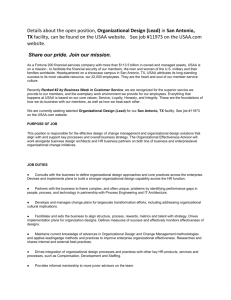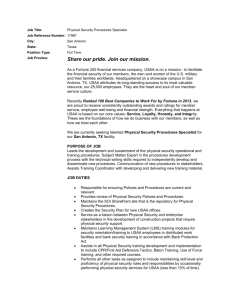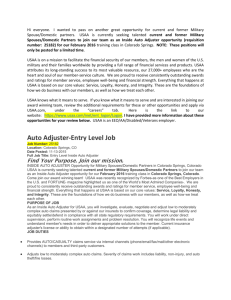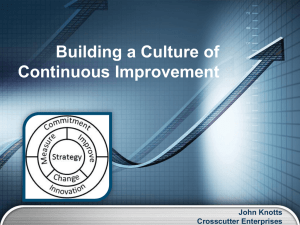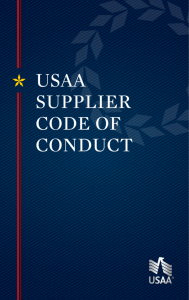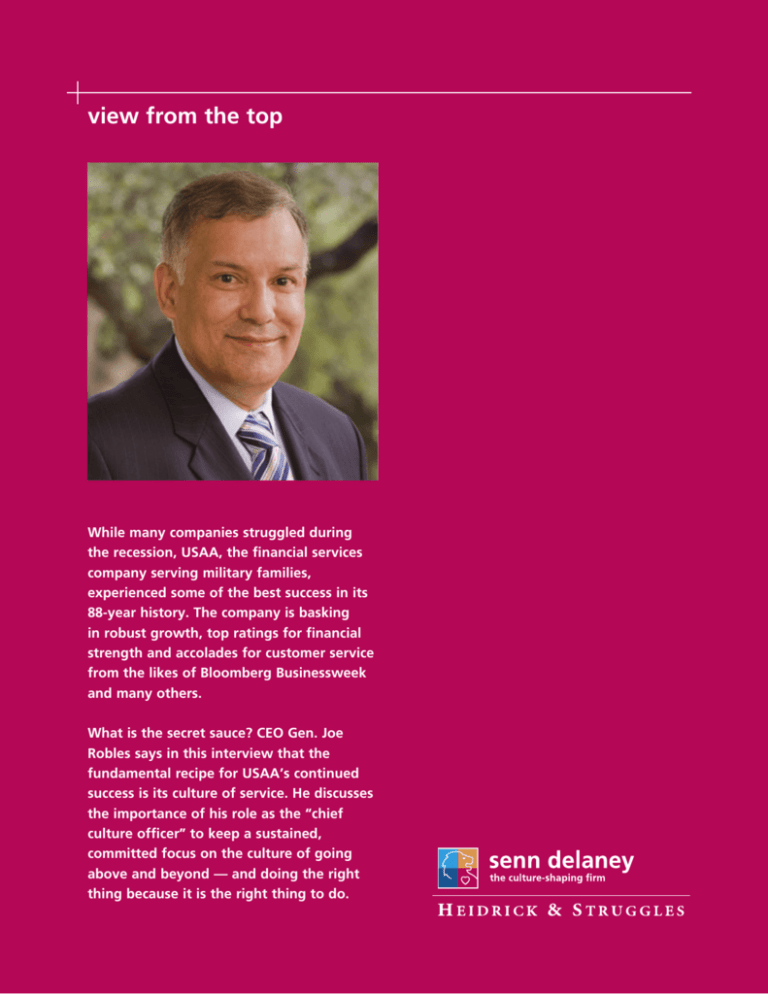
view from the top
While many companies struggled during
the recession, USAA, the financial services
company serving military families,
experienced some of the best success in its
88-year history. The company is basking
in robust growth, top ratings for financial
strength and accolades for customer service
from the likes of Bloomberg Businessweek
and many others.
What is the secret sauce? CEO Gen. Joe
Robles says in this interview that the
fundamental recipe for USAA’s continued
success is its culture of service. He discusses
the importance of his role as the “chief
culture officer” to keep a sustained,
committed focus on the culture of going
above and beyond — and doing the right
thing because it is the right thing to do.
“One of the big things that
came out of our culture work is
establishing a set of six
cultural objectives called
‘My Commitment to Service.’
Each one starts with “I”
because culture is really
sustained and shaped one
person at a time.”
USAA CEO discusses why a culture of going above and beyond
has created a huge competitive advantage
USAA has the highest ratings for financial
strength, it regularly ranks the best in
customer satisfaction, and 2010 is continuing to be a banner year. Through the
first half of 2010, USAA’s net worth grew
six percent to $18 billion; it is currently
ranked 66th in terms of net worth among
the Fortune 500. So, why does one of the
world’s best-rated companies stay laser
focused on its culture to be better and
better at serving its 7.8 million members?
What lessons are there for other leaders
who may not be achieving such success?
According to USAA CEO Gen. Joe Robles,
the culture is something you can never
stop nurturing. He attributes a big part
of USAA’s success to the passionate
commitment of leaders and frontline
employees to USAA’s six cultural pillars
called ‘My Commitment to Service’ and
to working from a higher purpose of
serving military families. That has created
a distinct competitive advantage that has
helped USAA not only survive the economic downturn, but thrive and grow.
Q Why did you first decide to
focus on the culture?
We began working on this in 2007.
When I first became familiar with Senn
Delaney and the work it has done all over
the world with some really large companies, I couldn’t wait to begin.
Q Given USAA’s strong history of
success, why is culture something you focus on?
At USAA, we believe that improving and
strengthening our culture are paramount.
Culture is not a gimmick, a promotion
or a one-time event. People think you
can take a strong culture and build it
up and then just move on to something
else and then it’s going to sustain itself.
Unfortunately, that’s not the way the
world works.
Q What in your career experience
and beliefs cause you to focus
so clearly and steadfastly on
people and culture?
It’s just as important for our employees to
understand how we do things as it is for
them to know the task.
To use an Army analogy, I can direct my
people to take that hilltop, but they are
going to encounter rocks and rattlesnakes
and other unanticipated obstacles along
the way. Culture gives our employees the
frame of reference to make the decisions
only they can make.
Q How do you keep that focus
on the mission and cultural
pillars and values alive in
the company?
We had a very strong foundation on
which to build. One of the big things that
came out of our culture work is establishing a set of six cultural objectives called
‘My Commitment to Service.’ Each one
starts with “I” because culture is really
sustained and shaped one person at a
time. These six statements of commitment to service get us as individuals fully
engaged, fully aligned and fully focused
on our company mission, our customers
and our fellow employees.
One of the things that I also do every
time I speak to employees is talk about
our mission — our company purpose —
and our core values of service, loyalty,
honesty and integrity.
USAA’s core values are very similar to
the core values of the U.S. military. They
may be stated a little differently, but it is
known throughout the company that we
will never equivocate or back down or
walk in the gray areas of these core values. They are strongly embedded in our
psyche and in our culture, and I think this
differentiates our company.
View from the top: USAA CEO Gen. Joe Robles
[2]
Q How important are your
employees to fostering the
culture and putting the principles to use in their daily work?
One huge success story for us is that all
of our employees have been through
some culture training. As a result, we see
a willingness to cooperate, a willingness
to work together, a willingness to focus
harder than ever before on our customers. I attribute that to the culture work
we have done and continue to do.
I think if you ask any of our employees
what the mission of USAA is, they could
quote it almost verbatim. If you ask them
about the core values we stand for, they
could tell you almost instantly. Everything
we do, every action we take, follows the
theme of doing the right thing because
it’s the right thing to do. We do some
things that other companies wouldn’t
think about doing from a business perspective and our employees know that.
They really shone during the very challenging 2008-2009, 2010 timeframe, and
this has been a great benefit to USAA
and the families we serve.
Q Can you provide any examples
of employees living the cultural
pillars that are the foundation
of the culture?
advantage.
“We see a willingness to
cooperate, a willingness
to work together, a willingness to focus harder
than ever before on our
customers. I attribute
that to the culture work
we have done and continue to do.”
The mortgage was not with us, but we
knew that she was in distress and it
would be a devastating blow to her, an
officer who was serving our country in
wartime, to let this mortgage company
take her house.
Our member service representative got
personally involved, making it possible
for this member to borrow some money
to get current and then help her get her
financial house in order.
Our member service rep. didn’t have to
do that. She could have told her there
was nothing we could do about it. But
she took it upon herself to say, “I need to
take care of this member who is serving
our country and doing what’s right for the
nation. I need to do what’s right by her.”
I can give you a lot of anecdotal evidence
of our culture being so strong. One of
the things I tell our employees is that we
really care about our customers as individuals.
Just recently, I shared with all the employees a phone call from one of our members, a young captain in Iraq. She had a
mortgage with another company and,
due to a lot of circumstances, including
her movement to the combat theater, she
was late on her mortgage payments. They
were about to foreclose and take away
her house. She called us in tears, asking
us if there was anything we could do.
Q It’s easy to see why your
company gets top ratings for
customer service, but has the
culture-shaping journey made
an impact on other business
results as well?
People ask me all the time what is USAA’s
secret sauce? How could you have done
so well during the economic meltdown
of the markets in 2008? Why is USAA
one of the few triple-A-rated companies
in America? I keep telling them that a
big piece of it is the culture of this company, and it has given us a huge business
You can see the improvement in customer
satisfaction. You can see the business
results and how we outperformed a lot of
our competitors over the past three to four
years. We’ve always done well, but it’s
especially coming through now because of
the strengthening of our culture.
Q Where do you see USAA four
to five years from now?
We will grow because USAA membership
is now open to anyone who has honorably served in the U.S. military – and once
they join, their family members are also
eligible. We are growing at a strong clip
because of the value we offer our members in terms of competitive products and
good advice from an honorable company
that has their best interests at heart.
Our employees want USAA to continue
to be there for the military and their families. They want us to continue to practice
the core values we’ve always had. The
members want us to be there, to take
care of their families, cover their flank
and do what’s right by them.
Therefore, it is absolutely imperative that
we continue stay focused on what has
made us so strong for the past 88 years. I
see us keeping our culture strong. I see us
continuing to communicate to employees
about ethics and core values and commitment to service — all the things we talk
about; all the things that make us who
we are as a company.
Q Do you still lead the culture
at USAA and why is that
important?
People ask me all the time if I think it’s
important for the CEO to own the culture
or whether I should have a chief culture
officer on my staff. I am the person most
accountable to the board of directors for
the results of this company and the culture of this company, so I am, by defini-
View from the top: USAA CEO Gen. Joe Robles
[3]
tion, the chief culture officer.
ees and members.
One of the things that I will pass on to
my successor will be a strong and vibrant
culture that is focused on our customers,
that is focused on our employees and
that continues our history of service and
strong financial results. If I can do that,
then I will have done my job as a CEO.
My greatest personal satisfaction comes
from developing the future leaders of this
company. I spend a lot lot of my time
teaching, coaching and mentoring the
people who are going to take over this
company and carry through the next 88
years of service to our nation, the military
and their families.
Focusing on and reinforcing the culture
is more important than any single event
that happens in my tenure because it is
the culture that I leave behind that will
carry this company well into the future.
Q Has the culture-shaping process
changed you personally as a
leader?
Q What’s your greatest personal
satisfaction since taking the
helm?
It absolutely has affected me. The culture
work gave me an appreciation for a lot of
things, and it’s made a visible difference
for all our leaders in helping them to be
better coaches to their teams.
Seeing the business moving forward has
been satisfying, and I have especially been
gratified to see the response of employ-
If I reach into my pocket right now, I
“Focusing on and reinforcing the culture is
more important than
any single event that
happens in my tenure
because it is the culture
that I leave behind that
will carry this company
well into the future.”
have a blue chip that I carry with me
every single day at work. It reminds me to
focus on the important things. I focus on
the company, I focus on the employees,
I focus on the members and I focus on
keeping this business model moving forward in a positive and direct way. ■
about Senn Delaney
Senn Delaney is the culture-shaping firm of Heidrick & Struggles International, Inc., the premier provider of Executive Search,
Culture Shaping and Leadership Consulting services worldwide. Founded in 1978, Senn Delaney was the first firm in the world
to focus exclusively on transforming cultures, essentially creating the corporate culture consulting industry. A singular mission
of creating healthy, high-performance cultures has made us the leading international authority and successful practitioner of
culture shaping that enhances the spirit and performance of organizations.
corporate offices
Los Angeles
7755 Center Avenue
Suite 900
Huntington Beach, California, 92647
t (562) 426 5400
London
40 Argyll Street
London
W1F 7EB
United Kingdom
main office line: +44 20 70754260
(from the U.S.: 011 44 207 075 4260)
Web site: www.senndelaney.com
Video channel: sdtv.senndelaney.com
©2014 Senn-Delaney Leadership Consulting Group, LLC. All rights reserved. No part of this may be
reproduced in any form without written permission of Senn-Delaney Leadership Consulting Group, LLC
View from the top: USAA CEO Gen. Joe Robles
[4]

